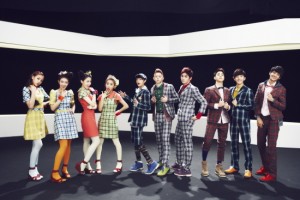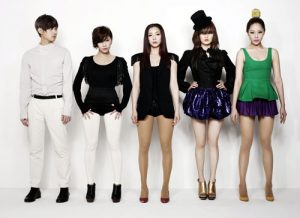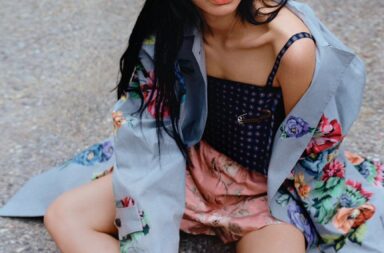 In the last few years, co-ed groups have again been on the rise, with the meteoric success of Troublemaker, K.A.R.D, and the recent debut of Triple H. With their successes, it seems difficult to understand why companies have, in the recent past, been so wary of co-ed groups.
In the last few years, co-ed groups have again been on the rise, with the meteoric success of Troublemaker, K.A.R.D, and the recent debut of Triple H. With their successes, it seems difficult to understand why companies have, in the recent past, been so wary of co-ed groups.
This avoidance stems back to two main reasons – propriety and fan service. Korea has strong social norms, and acting “properly”, is very important. For more on this, see prior coverage on sex and sexuality, homophobia[1][2], greetings and terms of address. To new fans, it can be bewildering to discover that, unlike Western artists, the closest a K-pop idol tends to get to wild partying and groupies is in their MVs. In this way, they’re almost treated like dolls; to be used then put back into their box, untouched until the fans are ready for them again.
Anyone who steps outside of these set boundaries, like Sulli, faces public disapproval which can manifest in various ways: negative gossip, online attacks, calls for psychological help, shunning by those around them, professional consequences, outright threats, and abuse. Sulli has been criticised for posting personally chosen images and comments that fans see as sexual, breaking her previously chaste and innocent image. It’s interesting how most would consider sexualised images of her to be professionally acceptable, but personally taken images as unacceptable. Arguably, female idols are often held to a higher standard of chastity and innocence, where men tend to be forgiven or excused.
 Demands for propriety are often linked to, or even result from, fan demands, jealousy and unrealistic marketing. One of the most successful marketing tools is the idea of an available idol who is just waiting for their beloved fan to come and sweep them off his/her feet. While fan service between the same sex and gender is often brushed aside, the thought of male and female idols in any kind of relationship almost automatically translates to “potential romance”. Obsessive fans feel jealous that someone else can have access to their beloved idol, which is especially harsh when they can’t. As these fans often spend a lot of money, these are concerns which companies consider. If we look at reactions to idols who date, especially those who show their relationship like Taeyeon and Baekhyun’s hidden messages, the backlash can be fierce.
Demands for propriety are often linked to, or even result from, fan demands, jealousy and unrealistic marketing. One of the most successful marketing tools is the idea of an available idol who is just waiting for their beloved fan to come and sweep them off his/her feet. While fan service between the same sex and gender is often brushed aside, the thought of male and female idols in any kind of relationship almost automatically translates to “potential romance”. Obsessive fans feel jealous that someone else can have access to their beloved idol, which is especially harsh when they can’t. As these fans often spend a lot of money, these are concerns which companies consider. If we look at reactions to idols who date, especially those who show their relationship like Taeyeon and Baekhyun’s hidden messages, the backlash can be fierce.
This company-enforced isolation between males and females is a pity, because at a time when most young people are forming relationships and testing out social skills, idols are forced to avoid any question of impropriety. They often miss out on meaningful relationships and important life skills in learning about relating to people of a different sex and/or gender. Idols who have close friendships with the opposite sex can be stuck in a catch-22; companies are likely to forbid public relationships, but if an idol is discovered in a secret relationship, the results could be devastating for the whole group. So how, then, can idols learn healthy communication skills in such a stifled and artificial situation?
 Because of this demand for propriety and fantasy, companies work extremely hard to keep a “clean” image. They must be careful with dressing rooms and practice spaces; they could require more supervision in the form of a chaperone. They may also require additional staffing for male and female styling, cannot share costumes and props, and so on. This, of course, is an ongoing extra cost for the company.
Because of this demand for propriety and fantasy, companies work extremely hard to keep a “clean” image. They must be careful with dressing rooms and practice spaces; they could require more supervision in the form of a chaperone. They may also require additional staffing for male and female styling, cannot share costumes and props, and so on. This, of course, is an ongoing extra cost for the company.
In addition, a good balance of talents and styles in a co-ed group is vital, though difficult to maintain. Male and female members should complement each other with varied and established roles — otherwise, why bother with a co-ed group? This creates its own complexities — group members are less likely to be able to easily cover for someone of the opposite sex if absent or ill. Then once the balance of skills has finally been achieved, male idols have compulsory army duty, causing disruption and meaning the group has a limited time to establish themselves. The risk of a scandal engulfing the group before costs are recouped (let alone turning a profit) can be perceived as higher with a co-ed group, and could also be a risk for CFs, an important way for groups to make money.
 And yet, despite this, we have the tremendous success of Troublemaker, and more recently, K.A.R.D. While there were co-ed groups before these two, Troublemaker paved the way for K.A.R.D by showing that a mainstream co-ed unit could be successful. Furthermore, on top of a catchy song with a popular storyline and an iconic dance, Troublemaker turned the co-ed musical stereotype on its head by having a female rapper and a male singer.
And yet, despite this, we have the tremendous success of Troublemaker, and more recently, K.A.R.D. While there were co-ed groups before these two, Troublemaker paved the way for K.A.R.D by showing that a mainstream co-ed unit could be successful. Furthermore, on top of a catchy song with a popular storyline and an iconic dance, Troublemaker turned the co-ed musical stereotype on its head by having a female rapper and a male singer.
In this respect, K.A.R.D’s choice of musical genre, “Dance Hall” venturing towards “Tropical House”, is a sound choice, helping them to stand out from other co-ed groups, while being on trend. They’ve also chosen a good time to promote; Troublemaker has done a lot of the work in opening fans’ minds to a co-ed group, while not actually claiming the title of a co-ed group. Despite their racy concept, Hyuna is repeatedly mentioned in the media as having a shy and innocent personality in real life, and both her and Hyunseung mention feeling uncomfortable and embarrassed when doing seductive and borderline scandalous photoshoots.
K.A.R.D is also very, very careful to avoid any appearance of internal relationships. They give the appearance of sibling relationships, and state that they will “never date each other”. This relationship could be appealing on its own; some of the best moments of their videos are in practices and hidden versions, where they sometimes make eye contact and genuinely smile at each other. They offer innocently playful fan service — jokingly encouraging each other when they swap lines and dance moves in a V App broadcast.
And yet, while they dance together, there’s no real connection or interaction beyond the surface. They tend to use each other like props, with fleeting, emotionless touches during dance scenes, rather than drawn out, realistic intimacy. Even when they dance together, they can be physically spaced surprisingly far apart, which is both a positive and a negative.
In terms of avoiding fan backlash, it’s smart, because there are always those who seek to find hidden meanings where sometimes there are none. But in some ways, it’s a lost opportunity. This playful sibling image doesn’t translate when performing love songs, and they also lack a realistic image of being lovers. Imagine the power in a group committed to songs about love and attraction, where the idols are comfortable enough to accurately portray sizzling charisma.
 In light of the recent successes of K.A.R.D, Cube has tried to recreate the Troublemaker magic, with Hyuna coupled with Pentagon’s Hui and E’Dawn.
In light of the recent successes of K.A.R.D, Cube has tried to recreate the Troublemaker magic, with Hyuna coupled with Pentagon’s Hui and E’Dawn.
Triple H, as their new unit is called, seem to be taking a slightly different direction to Troublemaker — at first glance a different sound, location and a distinctly different colour palette — filled with yellows, oranges and bronze. Interestingly, partakes in overt sexual implications. But looking closer, “365 Fresh” straddles a fine line — a concept too similar to Troublemaker will leave fans bored and a copy will court potential backlash at the thought of replacing Hyunseung. Conversely, a starkly different concept could alienate fans eagerly awaiting a Troublemaker comeback.
Triple H isn’t the same as Troublemaker, but neither are they markedly different, and whether fans and the public will accept them remains to be seen. Like the storyline, the sound of “365 Fresh” walks a tightrope, offering something slightly new and yet failing to completely distinguish itself. But “365 Fresh” pushes the boundaries of propriety in all kinds of ways — by painting criminal activities as “cool”, by romanticising self-harm and most interestingly, by implying all three are casual lovers.
How the public will react to “365 Fresh” and to continued co-ed groups and collaborations remains to be seen. K.A.R.D seem to have found success even before their official debut, though we’ve yet to see if Cube can make lightening strike twice with Triple H. In the meantime, fans of co-ed groups can rejoice and hope for this trend to continue into the future.
(Xsportsnews, Kuki News, The Korea Herald, OBS News, Newsen, EntertainmentAsia, V Live, YouTube[1][2][3] Cube Entertainment, DSP Media, YG Entertainment, Core Contents Media, Star Empire Entertainment)


